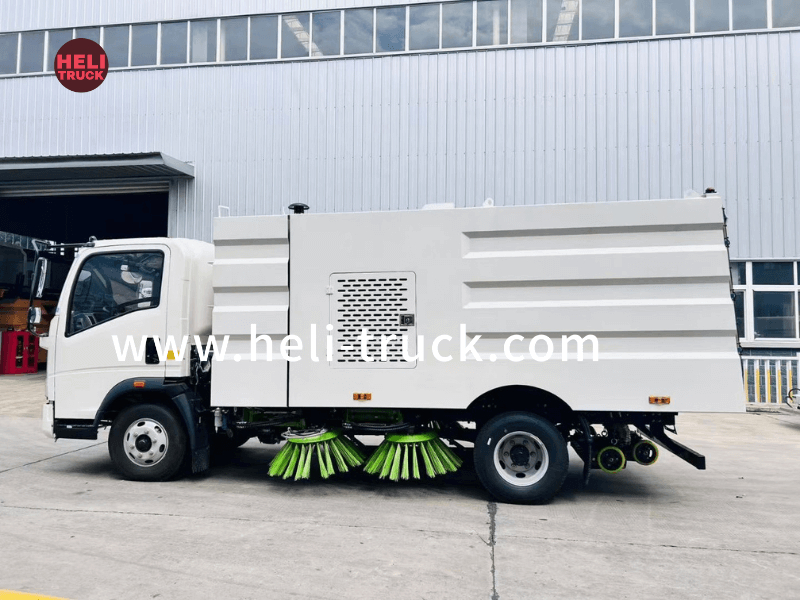Introduction
Garbage compactor trucks play a crucial role in modern waste management systems by collecting and compacting waste materials for transportation to disposal sites. These specialized vehicles are designed to handle large volumes of waste efficiently, but one key factor that often goes overlooked is their weight. Understanding the weight limitations of garbage compactor trucks is essential for ensuring the safety of operators, protecting road infrastructure, and optimizing the overall waste collection process.
History and Evolution of Garbage Compactor Trucks
Garbage compactor trucks, also known as refuse compactors or trash compactors, have been in use for decades to streamline waste collection and disposal operations. The first compactors were introduced in the early 20th century as a response to the growing volumes of urban waste generated by industrialized societies. These early models were basic in design and lacked the sophisticated features found in modern garbage compactor trucks.
Over the years, advancements in technology and engineering have led to the development of highly efficient and specialized compactor trucks. Today, these vehicles come in various sizes and configurations to meet the diverse needs of urban and rural waste management systems. From rear-loading compactors to side-loading models and front-loading units, there is a wide range of options available to suit different collection requirements.
Importance of Garbage Compactor Truck Weight
The weight of a garbage compactor truck is a critical consideration that impacts various aspects of waste management operations. Understanding and managing the weight of these vehicles is essential for several reasons:
1. Safety: Garbage compactor trucks are heavy vehicles that operate in urban and suburban environments where pedestrian and vehicular traffic is common. Exceeding the maximum weight limit of a compactor truck can compromise its stability and increase the risk of accidents. By adhering to weight restrictions, operators can ensure the safety of themselves and others on the road.
2. Road Infrastructure Protection: Overloaded garbage compactor trucks can cause significant damage to roads and bridges, leading to costly repairs and maintenance. By controlling the weight of these vehicles, municipalities can protect their infrastructure investments and prolong the lifespan of road surfaces.
3. Environmental Impact: Excessive vehicle weight can result in higher fuel consumption and emissions, contributing to air pollution and climate change. By optimizing the weight of garbage compactor trucks, waste management companies can reduce their carbon footprint and promote environmental sustainability.

4. Operational Efficiency: Properly managing the weight of garbage compactor trucks is essential for maximizing operational efficiency. Overloaded vehicles are less maneuverable and take longer to complete collection routes, leading to delays and inefficiencies in the waste management process. By staying within weight limits, operators can improve productivity and service quality.
road sweeper lorry Affecting Garbage Compactor Truck Weight
Several factors influence the weight of a garbage compactor truck, including:
1. Vehicle Size and Capacity: The size and capacity of a compactor truck determine how much waste it can collect and compact before reaching its weight limit. Larger trucks with higher capacities can handle more waste but may be subject to stricter weight regulations.
2. Type of Waste: The type of waste being collected also affects the weight of the compactor truck. Dense materials such as construction debris and wet organic waste are heavier than light materials like paper and plastic, requiring careful monitoring of the vehicle's weight during loading.
3. Compaction Ratio: The efficiency of the compaction mechanism in a garbage compactor truck impacts its weight management. Trucks with higher compaction ratios can compact more waste into a smaller space, reducing the overall weight of the collected material.
4. Regulatory Requirements: Local regulations and industry standards set weight limits for commercial vehicles, including garbage compactor trucks. Operators must comply with these regulations to avoid fines and penalties for exceeding weight restrictions.
Strategies for Managing Garbage Compactor Truck Weight
To ensure the optimal performance and safety of garbage compactor trucks, waste management companies can implement the following strategies for managing vehicle weight effectively:
1. Regular Maintenance: Proper maintenance of compactor trucks is essential for preventing excess weight due to mechanical issues. Regular inspections of the vehicle's components, including the compaction system, hydraulic system, and chassis, can identify potential problems and ensure optimal performance.
2. Load Monitoring: Operators should carefully monitor the weight of waste being loaded into the compactor truck to avoid exceeding its capacity. Using onboard weighing systems or portable scales can help track the weight of each load and prevent overloading.
3. Training and Education: Providing training to compactor truck operators on the importance of weight management and safe loading practices is crucial for promoting compliance with weight regulations. Operators should be familiar with the vehicle's weight limits and understand the impact of excess weight on safety and efficiency.
4. Route Planning: Efficient route planning can help minimize the weight of garbage compactor trucks by optimizing collection schedules and reducing unnecessary trips. By consolidating routes and prioritizing pickups based on waste volume, operators can maximize the vehicle's capacity without exceeding weight limits.
5. Waste Segregation: Separating different types of waste at the source can help distribute weight evenly in the compactor truck and prevent overloading. By segregating heavy materials from lighter ones, operators can achieve a balanced load that complies with weight restrictions.
Conclusion
Garbage compactor trucks are indispensable tools in modern waste management systems, but their weight must be carefully managed to ensure safe and efficient operations. By understanding the factors that influence compactor truck weight, implementing effective weight management strategies, and complying with regulatory requirements, waste management companies can optimize the performance of these vehicles and minimize their environmental impact. Prioritizing weight management in garbage compactor truck operations is essential for promoting sustainability, safety, and operational excellence in waste collection and disposal processes.
